View in other NatureServe Network Field Guides
NatureServe
Montana
Utah
Wyoming
Idaho
Wisconsin
British Columbia
South Carolina
Yukon
California
New York
White-stem stickleaf - Mentzelia albicaulis
Other Names:
Mentzelia montana
Native Species
Global Rank:
G5
State Rank:
S3S4
(see State Rank Reason below)
C-value:
4
Agency Status
USFWS:
USFS:
BLM:
External Links
State Rank Reason (see State Rank above)
Mentzelia albicaulis occurs in southwest and central Montana. Populations are scattered and occur in more counties than previously known.
- Details on Status Ranking and Review
Population Size
ScoreU - Unknown
Range Extent
ScoreF - 20,000-200,000 sq km (~8,000-80,000 sq mi)
Area of Occupancy
ScoreE - 26-125 4-km2 grid cells
Number of Populations
ScoreC - 21 - 80
Number of Occurrences or Percent Area with Good Viability / Ecological Integrity
ScoreB - Very few (1-3) occurrences with excellent or good viability or ecological integrity
Environmental Specificity
ScoreC - Moderate. Generalist or community with some key requirements scarce
Long-term Trend
ScoreU - Unknown
Trends
ScoreU - Unknown
Threats
ScoreD - Low
CommentNo known threats.
Intrinsic Vulnerability
ScoreC - Not intrinsically vulnerable
General Description
Plants: Annual. Stems whitish and shining (Hitchcock et al. 1961), 8–30 cm in height, simple (Lesica 2012) or frequently branched from below, smooth below, smooth to rough above (McGregor et al. 1986).
Leaves: Leaves basal and cauline, scaberulous (roughened minutely), possessing ability to attach to clothes and hair (McGregor et al. 1986), 2–8 cm in length (Lesica 2012), 2-12 mm in width (McGregor et al. 1986); basal leaf blades mostly linear, the margins entire to shallowly lobed, tapering to a narrow petiole; cauline leaf blades from nearly entire to laciniate with linear lobes, with short petiole or none (Hitchcock et al. 1961).
Inflorescence: Flowers single to several in an open flat-topped inflorescence, with flowering beginning at the margins and progressing inward (McGregor et al. 1986).
10X
(Lesica’s contribution adapted from
Lesica et al. 2012. Manual of Montana Vascular Plants. BRIT Press. Fort Worth, TX)
Phenology
Flowers May – July (McGregor et al. 1986; Hitchcock et al. 1961).
Diagnostic Characteristics
Mentzelia albicaulis resembles the more common
M. dispersa.
M. dispersa differs by possessing typically unlobed leaves as opposed to nearly entire to shallowly lobed, ovate rather than linear involucral bracts, and smaller papillae on the seed surface, requiring 20X lens to see as opposed to 10X (
Lesica et al. 2012. Manual of Montana Vascular Plants. BRIT Press. Fort Worth, TX).
Species Range
Montana Range
Range Descriptions
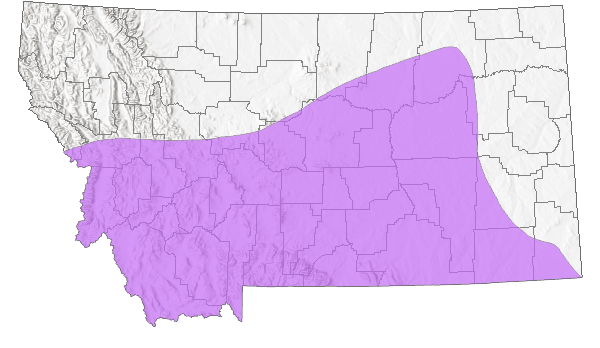
 Native
Native
Range Comments
BC to SD south to CA, NM, TX and Mexico (Lesica et al. 2012. Manual of Montana Vascular Plants. BRIT Press. Fort Worth, TX).
Observations in Montana Natural Heritage Program Database
Number of Observations: 76
(Click on the following maps and charts to see full sized version)
Map Help and Descriptions
Relative Density
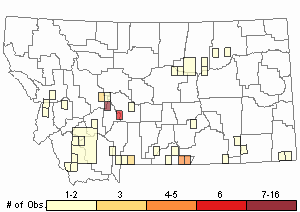
Recency
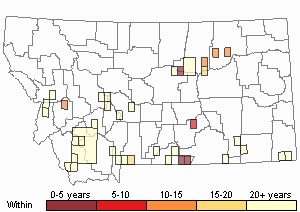
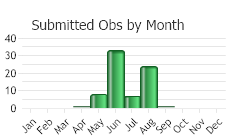
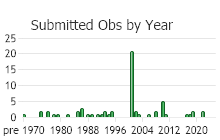
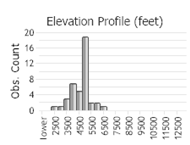 (Observations spanning multiple months or years are excluded from time charts)
(Observations spanning multiple months or years are excluded from time charts)
Habitat
Sparsely vegetated, often disturbed and sandy soil of grasslands, steppe, open forest; plains, valleys, montane (
Lesica et al. 2012. Manual of Montana Vascular Plants. BRIT Press. Fort Worth, TX).)
Ecology
POLLINATORS The following animal species have been reported as pollinators of this plant species or its genus where their geographic ranges overlap:
Bombus centralis,
Bombus fervidus,
Bombus huntii, and
Bombus pensylvanicus (Thorp et al. 1983, Williams et al. 2014).
Reproductive Characteristics
Flowers: Flowers yellow with linear bracts, diurnal; sepals 2–3 mm long; petals 5, obovate, 3–5 mm long (Lesica 2012); stamens numerous, shorter than petals (McGregor et al. 1986).
Fruit: Capsule cylindric, 8–20 mm long (Lesica 2012), ca 2 mm in diameter (Hitchcock et al. 1961), opening at the top with a valve (McGregor et al. 1986); seeds angular, in 2 to 3 columns, papillose under 10X (Lesica 2012).
(Lesica’s contribution adapted from
Lesica et al. 2012. Manual of Montana Vascular Plants. BRIT Press. Fort Worth, TX)
Stewardship Responsibility
References
- Literature Cited AboveLegend:
 View Online Publication
View Online Publication Hitchcock, C. L., A. Cronquist, M. Ownbey, and J. W. Thompson. 1961. Vascular Plants of the Pacific Northwest, Part 3. Saxifragaceae to Ericaceae. Seattle, WA and London, England: University of Washington. 614 pp.
Hitchcock, C. L., A. Cronquist, M. Ownbey, and J. W. Thompson. 1961. Vascular Plants of the Pacific Northwest, Part 3. Saxifragaceae to Ericaceae. Seattle, WA and London, England: University of Washington. 614 pp. Lesica, P., M.T. Lavin, and P.F. Stickney. 2012. Manual of Montana Vascular Plants. Fort Worth, TX: BRIT Press. viii + 771 p.
Lesica, P., M.T. Lavin, and P.F. Stickney. 2012. Manual of Montana Vascular Plants. Fort Worth, TX: BRIT Press. viii + 771 p. McGregor, R.L. (coordinator), T.M. Barkley, R.E. Brooks, and E.K. Schofield (eds). 1986. Flora of the Great Plains: Great Plains Flora Association. Lawrence, KS: Univ. Press Kansas. 1392 pp.
McGregor, R.L. (coordinator), T.M. Barkley, R.E. Brooks, and E.K. Schofield (eds). 1986. Flora of the Great Plains: Great Plains Flora Association. Lawrence, KS: Univ. Press Kansas. 1392 pp. Thorp, R.W., D.S. Horning, and L.L. Dunning. 1983. Bumble bees and cuckoo bumble bees of California (Hymenoptera: Apidae). Bulletin of the California Insect Survey 23:1-79.
Thorp, R.W., D.S. Horning, and L.L. Dunning. 1983. Bumble bees and cuckoo bumble bees of California (Hymenoptera: Apidae). Bulletin of the California Insect Survey 23:1-79. Williams, P., R. Thorp, L. Richardson, and S. Colla. 2014. Bumble Bees of North America. Princeton, NJ: Princeton University Press. 208 p.
Williams, P., R. Thorp, L. Richardson, and S. Colla. 2014. Bumble Bees of North America. Princeton, NJ: Princeton University Press. 208 p.
- Additional ReferencesLegend:
 View Online Publication
View Online Publication
Do you know of a citation we're missing? Britton, N. L. and A. B. Brown. 1913. An Illustrated Flora of the Northern United States, Canada, and the British Possessions. 2nd Edition in 3 Volumes. New York, NY: Charles Scribner's Sons. B13BRI01PAUS.
Britton, N. L. and A. B. Brown. 1913. An Illustrated Flora of the Northern United States, Canada, and the British Possessions. 2nd Edition in 3 Volumes. New York, NY: Charles Scribner's Sons. B13BRI01PAUS. Lesica, P., M.T. Lavin, and P.F. Stickney. 2022. Manual of Montana Vascular Plants, Second Edition. Fort Worth, TX: BRIT Press. viii + 779 p.
Lesica, P., M.T. Lavin, and P.F. Stickney. 2022. Manual of Montana Vascular Plants, Second Edition. Fort Worth, TX: BRIT Press. viii + 779 p. Quire, R.L. 2013. The sagebrush steppe of Montana and southeastern Idaho shows evidence of high native plant diversity, stability, and resistance to the detrimental effects of nonnative plant species. M.Sc. Thesis. Bozeman, MT: Montana State University. 124 p.
Quire, R.L. 2013. The sagebrush steppe of Montana and southeastern Idaho shows evidence of high native plant diversity, stability, and resistance to the detrimental effects of nonnative plant species. M.Sc. Thesis. Bozeman, MT: Montana State University. 124 p. Seipel, T.F. 2006. Plant species diversity in the sagebrush steppe of Montana. M.Sc. Thesis. Bozeman, MT: Montana State University. 87 p.
Seipel, T.F. 2006. Plant species diversity in the sagebrush steppe of Montana. M.Sc. Thesis. Bozeman, MT: Montana State University. 87 p.
- Web Search Engines for Articles on "White-stem stickleaf"





